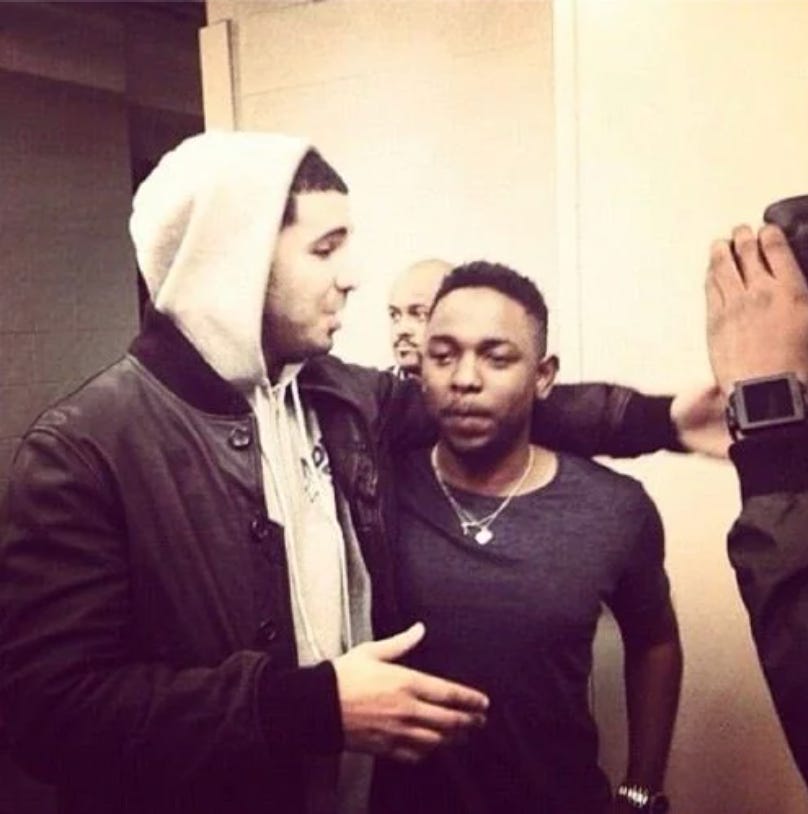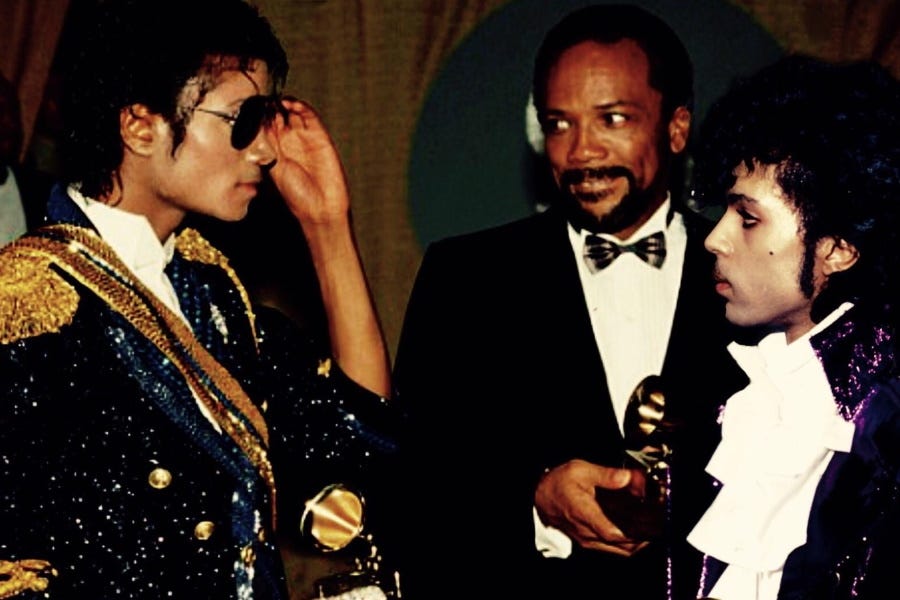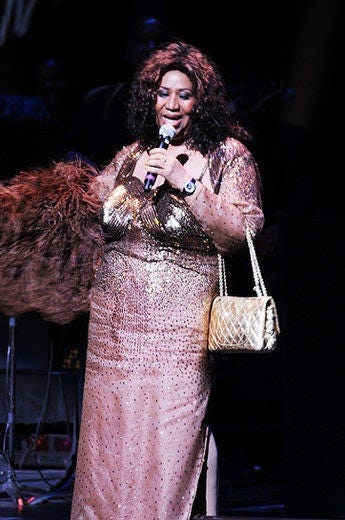Beef
On the Kendrick and Drake cooking show and the brokenness of rap music
A mending moan, a song to bring me home
In the same way that shade is a form of reading, which we learn from the new dialect for evaluating style revealed in the 1990 film Paris is Burning, beef is a form of dragging. People fight as a means of staying together; many battles indicate the fractured codependency between the opponents. Form defies function and rupture begets mending, union. Rappers risk their skin to traverse their masks of controversy, which are lucrative though shallow, like their fixations on one another disguised as enmity. A hunter leads his carrion to the fire and dances his corpse around the flames before entering himself. In rap music, beef is a half-hearted suicide pact. In print, between literary figures, it’s a fractured fable co-written by competitors, who, because they once loved or admired or shared with one another, do not like one another anymore, and are forced to resent their past bond. Their rejection of each other marks their abrupt and devout rejection of past versions of themselves. It’s passé and a little desperate, and the spectacle of power struggle that ensues often ends in death and maximalism, humiliation, backlash, a lid slammed on the career of someone who is worth more dead than alive.
Not Like Us
Under the rubric of this convoluted inheritance, Kendrick Lamar and Drake are at war; or at least simulating war for the recording industry elites because the attention economy is floundering and needs their acrimony for kindling. The frequency of a feeble rap battle cry could implement a summer of ecstatic hostility, a distraction that feels almost principled. While the geo-political landscape practices world-ending cataclysm in every direction, we will be in the club screaming they’re not like us, feeling betrayed enough to betray ourselves at last, got. We will reject the fake elite who create ruin for a living. We will favor ourselves in opposition to that hideous display. We will uncover formerly-hidden villains and realize we need them to better understand and cherish ourselves. And then we’ll overcome binaries, decide that they are just like us, they are the polarity that makes us possible. We live on a planet of duality yearning to transcend itself and enter the oneness of godheads. Those we’ve worshiped and made famous for speech acts over beats have god complexes that turn them luciferian; they’re rebel angels who are given so much they cannot stop seeking until the light burns them alive. They defy allegory and cliché by turning the fall from grace into song or rhythm that tempts us all to prop them up for a little longer, carry them, or go under alongside them to dance our angst into the sublime. So why, despite being ignited by hellfire, does the rap beef of 2024 feel like a cross between psyop and pseudo-ghetto-fabulous folk revival?
Perhaps because of the surrender-or-be-dragged element propelling the egos of all the men involved and the women and children they use as decoys. Mimicking the low-stakes anger of ex-lovers who still desire one another, the rappers yearn with indignation, their ability to sustain grudges defanged by their inability to meet the exigent social and political demands of the moment. Former Starbucks rapper Macklemore, who happens to be a white man adopting the tropes of black music, has been radicalized and has made the only mainstream rap addressing a burgeoning student protest movement causing upheaval and distress on college campuses across the country as students push their administrations to divest from the military industrial complex funding war and genocide worldwide with an emphasis on Gaza, where the display of violence has made complicity unbearable for these students. The others go gently into the night of their egomania to deflect from their silence on the issue. Resenting themselves for their misgivings and sustained by the lust they must now curtail, (the people are no longer wooed by vacuous displays of opulence or sex and drug addiction) they lash out at one another.
It’s more reluctant collaboration than conflict as they lean into the affects of bitter middle-aged men desperate for attention and using their shame and disappointment with themselves for reinvigoration. This earns them a portion of depreciating currency of validation, from fans and from each other. It also takes attention off of the high-profile court case against Diddy and executives like head of Universal Lucien Grange, who Ye calls Drake’s “rich baby daddy,” named therein. A few days into the beef, Grange’s name is removed from the case. Coincidence or windfall braced by his employees? The case outlines deranged and violating sex acts fueled by drugs and Grange is exonerated by insinuating defamation. Consider the possibility that the music industry has been infiltrated by ritualized sexual blackmail that began as a tactic under Hoover’s FBI, (used against MLK and others) was picked up by Clive Davis, who taught it to Diddy, who has used the tactic on almost every major name in the entertainment industry, obviously with the help of glamorized parties that function more like hazing than socializing. A forced inheritance. Consider the fact that every musician you’ve been taught to love was subject to some level of grooming in this tradition and had to compartmentalize between who they were creatively and who they had to be to survive going mainstream. And what if almost every mainstream artist got there by either complying or being coerced into silence about the complicity of their peers? This would explain the almost-confessional style in which Kendrick and Drake veil their self-abnegation as an issue with the other. My beef is with this loop sampled across eras and allowing black music to devolve into a harbor of greed, evil, terror, and scapegoating. Is this still our music, is it programming us to replicate that lifestyle? Does it matter when frequency is a power stronger than the self?
And how might this relate to a very sensational rivalry erupting during the summer of an election year when the power structure itself is in flux and demystified and only music can harness enough energy to take our attention off genocide and corruption and center it on the personal lives of a few heavily controlled men who are not at all like us, do not like us, are nothing like us, long to be like us and do not like us.
They speak over us to gossip about their limp vanities. The bland catastrophe of their grievances makes me miss MF DOOM, who was insightful enough to denounce worthy enemies early on—friends associates bitches niggas homies, close but really don’t know me, and argue with his alter-egos in his own mask-muffled voice. The new beefs feel contrived and too depraved and each party is implicated for having withheld incriminating evidence about a so-called rival until it was expedient to reveal, leaving that rival to abuse power with impunity for years and suddenly moved by a grudge’s tipping point to share information that could have shielded many from abuse or manipulation. This alone makes the drama a farce and the men involved puppets and pawns precluding their own liberation, using their talents against themselves and their fans.
The beef I love is shadier, and subtler, it slips into love’s costume for cover: Jimmy Baldwin and Richard Wright, Baraka and Baldwin, Billie Holiday and Lester Young, MLK and Malcolm, Prince and Michael Jackson, Miles and Ornette Coleman, Nina Simone and that man who wouldn’t pay her for known bootlegs, Aretha and promoters who didn’t pay in cash which she could put in the purse she carried with her on stage— it’s not meant to ruin your life it’s meant to enhance it and attack a dismissive superstructure with valid, often damning critique. These tender beefs are symbolic hyperbole for their own foregone thawing. This beef-for-mutual-publicity feels rigged and too rigid to assimilate. It’s blasé after a week and leaves us chanting the fable, they not like us as reminder that it can be used against itself. These men might be more aligned with the executives who own their music than their so-called fans, which is fine, but the prosthetic authenticity is smearing and it’s very boring to eavesdrop on karma in slow motion. Call us when they’re done, when the travesty becomes repentant, when Paul Simon’s “Sound of Silence” comes on and they can slow-dance or lindy hop at the empty club under soft blue lights. Why let them outsource their disgrace to us? They are not like us and do not like us. And we are falling out of love with hip hop.
It’s not like us to fall out of love. But what was once endearing about the rap music that sustains neoliberal consumerism with its cloying essentialism most apt for Tesla speakers and wine tastings, is now repulsively self-conscious and vaguely histrionic, or bluntly so. Blow on the table, a blow to the ego, the eagle glowing to sing along to BBL Drizzy, BBL Drizzy. The beef alleviates the drag. These men wake up in drag. Rap music, I love you but you’re dragging us down. The form is exhausted to the point of ennui, even starmaking cannot fix this. After this year’s Met Gala a couple weeks ago, the people retaliated at a stronger pitch and began a campaign of blocking all celebrities en masse in response to the grotesque display of indifference they all collude to uphold which seemed to culminate on the MET red carpet, in ornate gowns and three hundred thousand dollar seats at the table. We are rallying behind music we cannot yet hear except as displays of bravery and refusal. We did need to be reminded how they not like us but now we’re left asking who are they, who are they like, what spell were we under to adore them so? And do we have the courage to act like ourselves now that it’s all been broken?
(In a whisper)
A genius is the one who is most like himself, Thelonious Monk once announced. That’s all the most disgruntled among us are seeking, to be returned to themselves whole.





There's not a better piece of writing on this beef than your essay. I had a stray discussion about this being a psyop and thought I was a) overly paranoid so felt self-conscious about speaking it aloud and b) giving too much credit to what could be egomania run amok. But these social platforms function as mass mesmerism neuro-chemical bombs and the undue amount of attention to one thing in an age when attention is confoundingly scarce? It feels hopeless and orchestrated. Thank you for putting words to the Last Human Voices of Compassion and Grit.
This is brilliant.